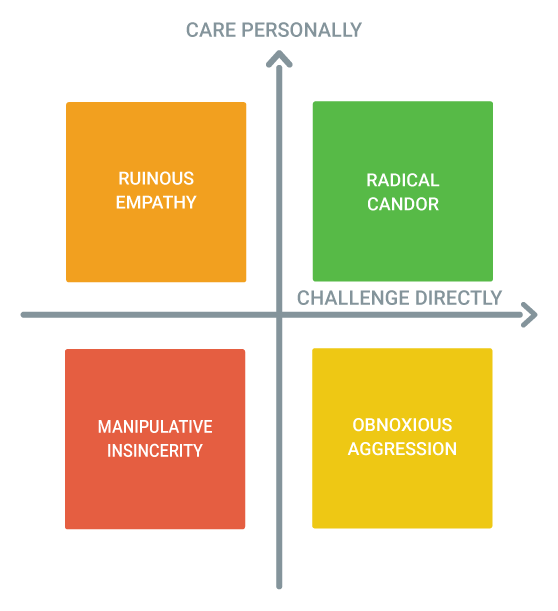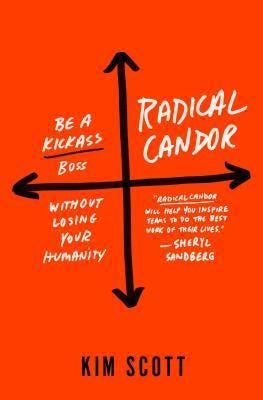Hey learners,
As automation and A.I. dramatically change the nature of work (as we learned last week), we must fine-tune our social and emotional abilities a.k.a soft skills that machines cannot master.
Soft skills are vital as they impact culture, mindsets, leadership, and behaviors in the workplace.
Whether you are a leader, entrepreneur, coach, or just a regular employee, mastering mindful communication while keeping it real is crucial to your team’s success and org. culture.
Keeping this in mind, this week we’re learning Radical Candor, a communication framework coined by management guru Kim Scott.
Today’s Skill: Radical Candor
Estimated reading time: 5 minute 32 seconds“Make sure that you are seeing each person on your team with fresh eyes every day. People evolve, and so your relationships must evolve with them. Care personally; don’t put people in boxes and leave them there.”
Note: Once each month, I’ll be talking about different soft skills and management frameworks to learn. There’s no right way to learn these. Consuming content, followed by a combination of constant practice and self-reflection is a good start. I’ll share more tips in the coming months, but if you have anything that’s worked for you, please reply and share.
🦜 What is Radical Candor?
Radical Candor is “the ability to challenge directly and show that you care personally at the same time.” The main idea is centered around giving/receiving feedback and creating a culture of open communication.
Challenge Directly - telling people when their work is or isn’t good enough
Care Personally - giving a damn about people, being genuine, and getting to know others at a human level
In short, Radical Candor is truth with kindness.
I first heard this term in May 2019 when Saba Karim from Techstars flew in from Boulder to Melbourne to run a 4-day workshop with us at SPARK Deakin. I was helping him our operationally and he shared some reading material on Radical Candor before we started.
I didn’t understand the usefulness of it first. But amidst the early mornings, late nights, and jam-packed days, there came a moment when Saba asked me to step up my game and get things done, fast. I was a bit taken aback at first and went on doing my work. Later when the team was hanging out together, it dawned me. I realized Saba was challenging me directly, but from a place of kindness. Was it harsh? Maybe a little, but it didn’t matter because I needed it.
Earlier this year, I joined Techstars as an Associate in Bangalore and I read this post on Radical Candor by David Brown, co-CEO of Techstars. The whole organization works on this principle. There were 10 startups in the batch and every week we had an All Hands meeting to share progress. Giving feedback can be hard, especially in public. But I saw the Managing Director effortlessly share honest feedback and guidance, that was kind and specific. Sometimes harsh, but that’s what the founders needed.
Candor, Inc. developed this graph to show the journey towards Radical Candor:

“If you can't offer radical candor, the second best thing you can do is be an asshole.” - Kim Scott
Here’s what the other quadrants mean:
Obnoxious Aggression: brutal honestly without caring. Praise that doesn’t feel sincere or criticism that isn’t delivered kindly.
Ruinous Empathy: sugarcoating praise and unclear criticism. Caring but not challenging.
Manipulative Insincerity: backstabbing, political behavior. Flattery to a person’s face and harsh criticism behind their back.
🤖 Why learn? (Learning Objectives)
My Points:
Have communication that drives meaningful growth and change
To build stronger teams, and become a better boss/coworker
Applicable in other areas of life - sports coaching, peer feedback in university, sharing thoughts on your friends business idea or projects
From one of Kim Scott’s courses:
Design powerful questions and processes for soliciting constructive feedback
Determine the best circumstances and approaches for providing feedback to others
Employ managerial tactics to develop an organizational culture of radically candid feedback
📋 Resources
*You don’t have to go through all the resources. Pick the format that works for you.
Read:
Book: Radical Candor by Kim Scott

No time to read the book?
Check out this useful summary (7 min read) + Radical Candor — The Surprising Secret to Being a Good Boss
Watch/Study:
Kim Scott on Radical Candor - $25
3-hour masterclass on becoming a better leader by learning to give and solicit radically candid feedback from CEO coach Kim Scott
Listen:
- Defining Radical Candor – and How to Do It (27 min)
- Radically Candid Criticism (22 min)
🚀 Action
Time to apply what you have learned:
Start by asking for criticism, not giving it
Get people to tell you what they really think - Read this for tips
Give Feedback
Find your balance of challenging directly and caring personally - Read this for tips
👉 Since we’re talking about feedback, if you have any comments on my newsletter, please hit reply and let me know :)
🔖 Something to Watch
“It gets easier. Every day it gets a little easier. But you gotta do it every day — that’s the hard part. But it does get easier.“
I haven’t seen the whole series, but Bojack Horseman does get pretty real.
One of the comments read, “The realest show I've ever seen is a cartoon about a talking alcoholic horse. I don't know how to feel about that.”
Todd gets radically candid to Bojack in this clip below:
YouTuber Casey Neistat is a master storyteller. He's worked with brands like Samsung, Adobe, Google, and Mercedes-Benz that evoke emotion and humanize the brand. This video for Nike from 2012 has been called "the best-branded story ever told." It became Nike's most-watched video of all time.
In 2015, Casey set a personal challenge to vlog every single day for over a year to get over the frustration and boredom of the creative process. He says:
"To sit around and say, 'I’m not motivated, so I can’t do anything,' to me is the same thing as being like, 'I’m so hungry, I can’t eat.' The only way you’re going to alleviate your hunger is to eat some food. The only way to fix your motivational problem is to do something.”
If you’re reading this but haven’t subscribed, you can join us below:
Thank you for tuning in. If you have any feedback or comments, I’d love to hear from you, just reply to this email.
See you next week!


